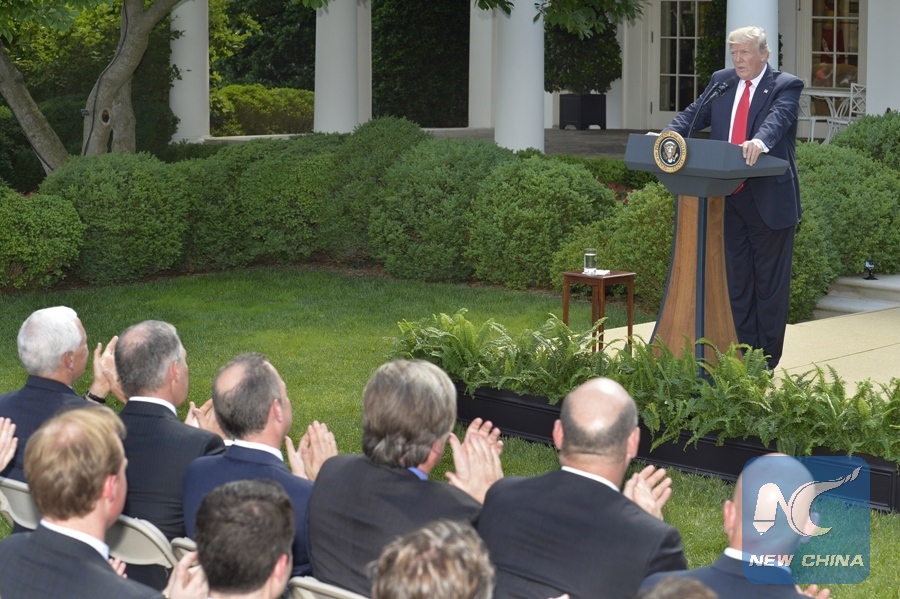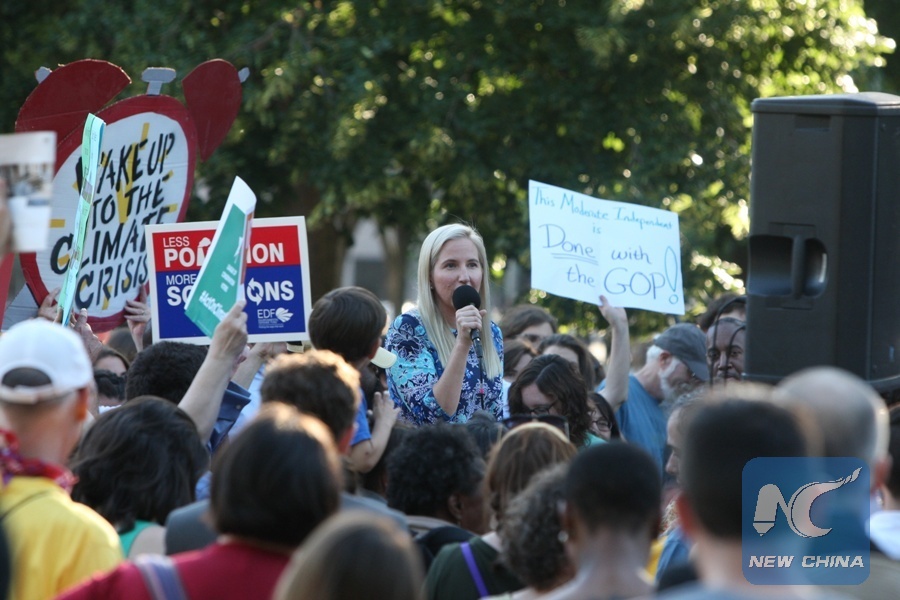
U.S. President DonaldTrump delivers a speech at the White House in Washington D.C., capital of the United States, on June 1, 2017.(Xinhua/Mike Theiler)
by Lu Jiafei, Lin Xiaochun
WASHINGTON, June 3 (Xinhua) -- U.S. President Donald Trump's decision to leave the landmark Paris Agreement on climate change was short-sighted and he underestimated the challenges for renegotiation to re-enter the accord or a new one, U.S. experts said.
Trump announced the decision in the White House Rose Garden on Thursday, citing concerns about the accord's threat to the U.S. economy as a main reason for the withdrawal.
"The cost to the economy at this time (by 2040) would be close to 3 trillion U.S. dollars in lost GDP and 6.5 million industrial jobs," said Trump, citing figures from a disputed study commissioned by the American Council for Capital Formation and the U.S. Chamber of Commerce, both known for lobbying against climate regulations.
Questioning the accuracy of the figures cited by Trump, Jonas Nahm, assistant professor of energy, resources, and environment at Johns Hopkins University, said that Trump's economic justification for pulling out was short-sighted.
"It's clear that pulling out of the Paris Agreement strains sustainable energy industry that already employed more people in the United States than coal," Nahm told Xinhua, adding that in the long run, economic costs of inaction on climate change could also be far higher.
"Mitigation is much cheaper than adaptation. We're shifting the burden of dealing with climate change into future generations," said Nahm. "So the economic figures he cited don't include these long-term consequences."
Before the decision on Thursday, Trump, who once called climate change a "hoax," had already taken a series of actions aimed at reversing his predecessor Barack Obama's climate policies.
In March, with coal miners standing by, Trump signed an executive order mainly targeting the Clean Power Plan, a signature effort by Obama to reduce greenhouse gas emissions from coal-fired power plants in keeping with U.S. promises of the Paris Agreement.
In his first budget request, Trump also proposed a 31 percent reduction in funding the U.S. Environment Protection Agency.

A demonstration is held to protest against U.S. President Donald Trump's decision to withdraw from the Paris Agreement, outside the White House in Washington D.C. June 1, 2017. (Xinhua/Yan Liang)
Now with the decision by the largest economy to pull out of an international accord on climate change, the ripple effect for the prospect of renewable energy will surely be felt across the globe, said John Sterman, professor at the Sloan School of Management of the Massachusetts Institute of Technology (MIT).
"U.S. withdrawal from the Paris Agreement creates uncertainty for businesses and governments around the world about investment opportunities in the solar, wind and other emerging green energy industries," Sterman told Xinhua.
However, for a country that prides itself on technological innovation, the United States could end up being one of the biggest losers.
"The government plays a huge part in the R&D (research and development) infrastructure in this country," said Nahm. "Pulling out of Paris (Agreement) is shifting attention and resources away from innovation."
Yet, despite his decision to leave the Paris Agreement, Trump would stick to the four-year-long withdrawal process stipulated by the Paris Agreement, which means that the U.S. withdrawal won't take effect till November 2020, about two months away from the end of his first term.
During his speech on Thursday, Trump said the United States would begin negotiations to re-enter the Paris Agreement or make a new deal.
However, Trump indicated that re-entry may not be a top priority for his administration.
"If we can, great. If we can't, that's fine," said Trump, adding that the new agreement must ensure "fair" treatment to the United States, its businesses, its workers, and its taxpayers.
"There is a significant risk that the administration has underestimated the complexity of global climate negotiations," David Livingston, associate fellow in Carnegie Endowment for International Peace's Energy and Climate Program, told Xinhua in an email.

A demonstration is held to protest against U.S. President Donald Trump's decision to withdraw from the Paris Agreement, outside the White House in Washington D.C. June 1, 2017. (Xinhua/Yan Liang)
Since the 1990s, the international community has been engaging in forging collective actions on climate change. But history since then has abounded with frustration and failure.
The Paris Agreement of climate change, agreed on by almost every country in the world in 2015 after lengthy negotiations, aims to tackle climate change by cutting greenhouse gas emissions and sets a global target of keeping the rise in the average temperature no higher than 2 degrees Celsius above pre-industrial levels.
Just six years before the achievement of the Paris Agreement, a global attempt to resolve climate change at Copenhagen, Denmark, collapsed.
Experts cautioned that it was still too early to assess the fate of the Paris Agreement. Major powers in the world, including the European Union and China, have reaffirmed their commitment to the climate agreement, and no other countries have so far indicated intention to either follow the U.S. footsteps or water down their commitment.
However, the consequences could be significant for the United States if the withdrawal does happen in the end.
"The withdrawal from the Paris Agreement, when set against the backdrop of the earlier withdrawal from TPP (Trans-Pacific Partnership), further narrows the window for U.S. business and workers to participate in -- and benefit from -- some of the fastest growing markets in the world," said Livingston.

